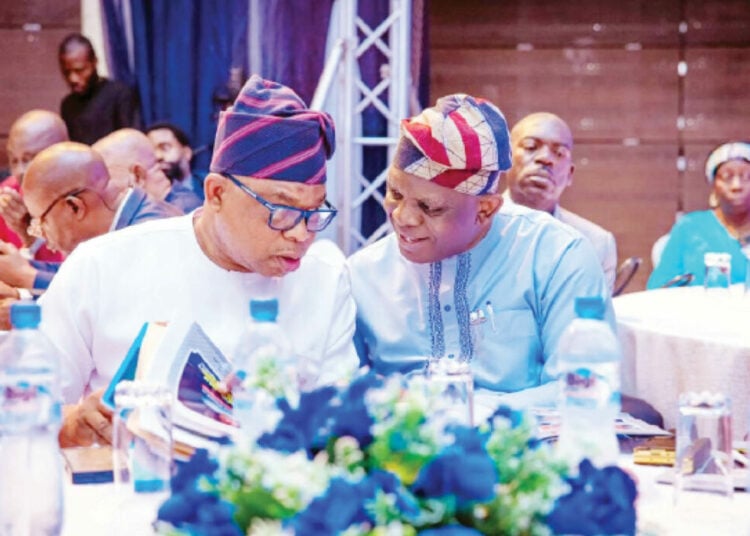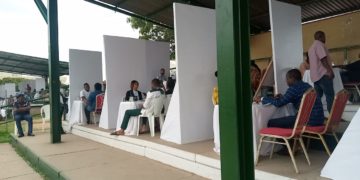One of the many challenges facing the Marine and Blue Economy Ministry is the incessant boat mishaps on the nation’s inland waterways.
The mishaps have defiled all successive administrations, making them a scourge, defining all known solutions.
However, to find a lasting solution to the scourge, the Minister of Marine and Blue Economy, Adegboyega Oyetola, set up a committee to find lasting solutions to the country’s incessant boat mishaps.
However, as the committee set up by the minister of marine and blue economy submitted its reports, independent investigations by journalists in Niger state, one of the States prone to boat mishaps, have shown why accidents are rife on the northern flank of the nation’s inland waterways.
According to reports by locals, operators, regulators, and government officials, mishaps are fueled by poor marking of the inland waterways, passengers’ poor use of life jackets, the absence of boat certification, waterways infrastructure such as jetties, night voyages, and archaic cultural beliefs, among other factors.
Overloading is also attributed as one of the causes of the mishaps, as operators overload their craft, lifting hundreds of passengers with a herd of cattle, machinery, food items, vehicles, among others, thereby threatening waterway safety in the nation’s waterways.
For instance, the transport commissioner of Niger State, Hadiza Idris Kuta, said the last boat mishap in the state was caused by the boat hitting a submerged shrub.
According to her, the captain, unfamiliar with the route, took the boat with passengers and hit it against a submerged shrub, causing a mishap.
She, however, said the state government has started replacing old wooden boats with fibre boats to curb accidents and is also employing safety Marshals to complement the National Inland Waterways Authority (NIWA) water marshals in all riverine communities to enforce safety compliance.
Idris Kuta said the government is collaborating with NIWA to sensitise riverine communities and operators on the use of life jackets and other measures to curb mishaps.
The commissioner, who applauded NIWA and the Marine and Blue Economy Ministry for donating 3,700 life jackets to the state, said every jacket had been distributed to the end users.
Speaking on the people’s cultural beliefs and how they fueled mishaps, the commissioner said, “When that boat accident happened, we had a boat at the station, a speed boat specifically stationed for search and rescue operations, but even on the day of that accident, they didn’t use it.
“The government gave it to them, but when they came to use it for rescue, they didn’t use it because they felt the person had already fallen into the water, and the spirit had taken the person. So, we need to do a lot of sensitisation and a lot of work to enlighten the locals about rescue as well as change their beliefs on the best mishaps.”
Speaking further, she said most boats are not registered because it is expensive to do so; they cut corners and operate their boats illegally.
“Another issue we have is that sometimes even getting the license is quite expensive. As I said, everything marine is very expensive, so a lot of locals can’t afford it, so they would rather cut corners or go behind the door and start using their boats.
“So, these are all things we need to check. In this whole area, everybody uses wooden boats because they can’t afford to buy plastic boats or fibre boats. So, if there’s a way, the government can come in to help them, a scheme or something that can help them purchase safer boats because of the authority phase-out of the wooden boats, the whole area will be cut off.”
She, however, concluded that the government would start enforcing standards by arresting and prosecuting boat operators who go against the NIWA waterways codes.
On his part, the chairman of Munya local government area in Niger State, Aminu Najume, said adhering strictly to water transportation safety measures is one of the solutions to curbing recurring boat accidents in the state.
Najume said the council has continuously sensitised residents on the dangers of night travel, overloading, and failure to wear life jackets while boarding boats.
He disclosed that while many have complied with safety guidelines on the inland waterways, others remain negligent, a situation he said is responsible for recent tragedies.
Citing a recent boat mishap in the area, Najume explained that passengers who wore life jackets were rescued, while those without them lost their lives.
“The Ministry of Transport and the state government have done a lot, especially by providing life jackets. Those who wore them survived, but those who didn’t perished,” he said. “Unfortunately, people in rural areas often prioritise transporting goods over safety.”
To address the challenge, Najume emphasised the need for enforcement, sustained sensitisation, and improved water transport infrastructure. He appealed to the Niger State government to intensify safety measures in riverine areas.
Under his leadership, Munya LGA has created a dedicated social department with five desk officers who routinely visit communities, especially during the dry season, to educate residents on the dangers of unsafe water travel, overloading, and building houses near riverbanks.
Despite these efforts, negligence persists, thereby narrating how an overloaded engine boat carrying grains, cows, machines, and passengers capsized after hitting underwater shrubs. Several lives were saved due to the use of recently distributed life jackets, while others without them drowned.
Looking ahead, the chairman said he plans to personally lead a post-bye-election tour to riverine communities to reinforce safety messages in local dialects. He also identified the need for ferries as safer and more efficient alternatives to canoes and wooden boats.
“I appeal to the state government, through the Ministry of Transport, to provide us with a ferry. It will reduce risks, generate revenue, and allow for continuous safety enforcement at boarding points,” he said.
Najume also welcomed the deployment of water marshals to monitor jetties and called for penalties against passengers who refuse to wear life jackets. He stressed the importance of collaboration between Munya and Shiroro LGAs, given their shared waterways, market access points, and cultural ties.
On his side, the area manager, Niger/Kwara, Area office, NIWA, Akapo Adeboye, identified overloading, cultural beliefs, overspeeding and night travelling as safety gaps threatening inland water transport in the area.
According to him, the office has carried out sensitisation programmes in various local languages to preach to the locals on the need to adhere to safety at all times.
“The major challenge we have here is the behaviour, character and attitude of the locals. They believe that nothing can happen to them on the waters because they are born and live around the water. So, when engaging them, we do that in partnership with the people of the union.
“Another area of challenge is insufficient boats, in terms of fibre boats. We have been encouraging them, telling them this wooden boat is archaic. People need to begin now to change the trajectory. NIWA, alongside the state government, calls on Boat Owners and Freshwater Association members to work together to enforce safety.
Now, no life jacket, no entry into the boat as we have started enforcing the 2023 Inland Waterways Transportation Code, that is no life jacket, no travel, no life jacket, no boarding, at the same time to ensure that no overloading, to ensure that no overspeeding, to ensure that if you travel after 6 pm, NIWA, with the Marine police, alongside with Civil Defense, DSS around the vicinity, will work together as a team to ensure arrest and if you are arrested, such people will be prosecuted, and at the same time, be jailed. These are things we’re setting out to do,” Adeboye stated.
He stated further that the NIWA area office, with the support of the Ministry of Marine and Blue Economy, has started marking navigational routes for boats to use.
“In terms of buoying, we have buoyed the Bagibo Mokwa to Bagibo Muti; we have live buoys there. We’ve taken down the survey, the scanning and the surveillance of the water form of Kainji Lake, from Malalee to Lokomere, up to Wara, Wara is the boundary of Kebbi State, down to Kokoli, I told you two trajectories, from the Malalee point, down to the point of entry to Kemi, and the point of entry going to the Niger Republic, which is Kokoli, from the point of Kokoli,” he stated.





